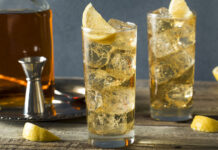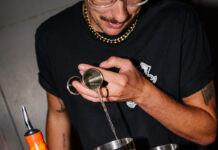The right refrigeration setup is crucial to keep customers coming back

QUALITY is king in the on-trade – with everything from glassware to garnish playing a part in helping bar staff deliver the ‘perfect serve’. But the look of a drink will matter little if the temperature of the liquid is not right.
That was the message from refrigeration and ice making specialists, who told SLTN that serving drinks at the right temperature is crucial if licensees are to secure repeat sales.
Robert Campbell of Glasgow-based catering equipment supplier Quality Equipment Distributors (QED) said: “Back-bar coolers have become a very important piece of equipment for bars and clubs in recent years.
“The correct temperature of the product is tantamount to the [operator] getting repeat sales, and has a big impact on the [customer’s] perception of the venue.”
The temperature of the glass itself is another important consideration, reckons Nick Williams, managing director of Precision Refrigeration, who said a cold, frosted glass “is the prerequisite to serving a perfect cocktail or premium beer”.
“Frosted glasses enhance the taste of the ingredients and keep the drink cool for longer with the added bonus of looking stunning as well,” he said.
Back-bar coolers have become a very important piece of equipment for bars and clubs.
Ultimately, a pub’s back-bar refrigeration setup must “deliver the optimum combination of aesthetics and functionality”, said Malcolm Harling of Williams Refrigeration.
“It needs to maximise the display area and look good, whilst delivering high performance refrigeration,” he added.
Echoing this view, Campbell of QED said: “Operators should look for maximum vision of the product through the glass doors of the cooler.
“It should be fan assisted for quick pull down of temperature – and be well-ventilated, preferably to the front of the cabinet.”
And as it will typically be in operation 24 hours a day, seven days a week, licensees must consider the energy efficiency of any new back-bar system, as “it makes sense to choose a model that has energy saving features”, said Williams of Precision Refrigeration.
Durability was also highlighted by Harling of Williams Refrigeration. He said: “Modern, quality refrigeration can last for ten years or more if it is looked after properly and regularly serviced.”
Reinforcing this stance, Campbell of QED believes there “is a definite link between good maintenance and the longevity of your back-bar cooler”.
Ice is classed as a food and therefore icemakers must be kept hygienically clean.
Similarly, Scott McGillvary of Sims Automatics said the shelf life of this type of equipment “depends on usage and the environment the machines are kept in”.
“Basic maintenance should be carried out on a weekly basis by members of staff, as cleaning vents, filters, outer surfaces, ice bins etc. keeps the machine in a hygienic condition,” he said.
Another vital component of a pub’s back-bar operation is an ice machine, according to equipment suppliers.
Mark Hogan, commercial director of Foodservice Equipment Marketing (FEM), said ice machines “need to be reliable and conveniently situated to ensure drinks can be served with mountains of ice even when there’s a rush at the counter”.
He added that, with an extensive range of modular and undercounter ice machines available in a variety of sizes and outputs, “it is important to find the model best suited to your establishment and ice requirements”.
And as ice is classed as a food, Hogan said operators who choose to utilise icemakers “need to ensure the machines are kept hygienically clean, [the] ice is handled correctly and best practices followed”.
Echoing this view, David Rees of Hubbard Systems, which distributes the Scotsman range of icemakers, said staff training is “vital” to ensure a venue’s ice machine is kept clean at all times.
“They should be trained not only to follow the manufacturer’s suggested cleaning schedule, but also to be aware of how the equipment works, as this will help them recognise any faults if they develop,” he said.



















